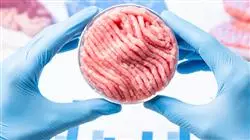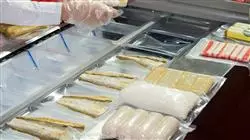University certificate
The world's largest faculty of nutrition”
Introduction to the Program
Become a successful nutritionist with transversal skills which allow you to, in addition to designing nutrition plans, guarantee the safety of these diets”

The Professional master’s degree in Food Safety for Nutritionists is the most complete among those Master’s Degrees currently offered at universities because it is geared towards integral Food Safety for Nutritionists management. Therefore, it covers all the necessary aspects to achieve a complete specialization, demanded by professionals in the food sector.
The teachers of this Professional master’s degree are university professors and professionals from various disciplines in primary production, the use of analytical and instrumental techniques for quality control, the prevention of accidental and intentional contamination and fraud, traceability, and regulatory certification schemes in Food Safety for Nutritionists.
The Professional master’s degree in Food Safety for Nutritionists is based on a triple thematic structure: Quality, Food Safety for Nutritionists and Research and Development (R&D). In other words, it contains a scientific-technical part, a quality and safety management part and a third part, focused on research and development of innovation projects, supported by the guarantee of Food Safety for Nutritionists, quality assurance and sustainability in its production and the necessary Food Safety for Nutritionists at a global level.
This program has been designed to respond to the demand of diverse professional profiles and professional disciplines such as basic sciences, experimental sciences and engineering, social sciences and the field of new technologies. In addition, it is focused on understanding and learning technical, management and project execution competencies, as well as the development of skills required by a competitive, innovative and modern food sector.
Students of the Professional master’s degree in Food Safety for Nutritionists will complete their specialization with a comprehensive perspective and training, both in product processes and, globally, in the certification of Food Safety for Nutritionists in the food sector. We will start from primary production and food processing, applicable legislation and regulations, quality management to ensure Food Safety for Nutritionists, through to integration into research projects, in the development of new products, their coordination and implementation.
It is an educational project committed to training high quality professionals. A program devised by professionals specialized in each specific field who encounter new challenges every day.
You will be supported by teachers who are experts in food legislation and quality and safety regulations who will guide you through the entire process’’
This Professional master’s degree in Food Safety for Nutritionists contains the most complete and up-to-date scientific program on the market. The most important features include:
- Practical cases studies are presented by experts in Food Safety
- The graphic, schematic, and eminently practical contents with which they are created, provide scientific and practical information on the disciplines that are essential for professional practice
- Latest information on food safety
- Practical exercises where self-assessment can be used to improve learning
- Special emphasis on innovative methodologies in Food Safety
- Theoretical lessons, questions to the expert, debate forums on controversial topics, and individual reflection assignments
- Content that is accessible from any fixed or portable device with an Internet connection
This complete Professional master’s degree is the perfect opportunity to advance in your professional career and start to position yourself as a prestigious nutritionist”
The teaching staff includes professionals from the field of Food Safety for Nutritionists, who bring their experience to this training program, as well as renowned specialists from leading societies and prestigious universities.
The multimedia content, developed with the latest educational technology, will provide the professional with situated and contextual learning, i.e., a simulated environment that will provide immersive training programmed to train in real situations.
This program is designed around Problem-Based Learning, where the specialist must try to solve the different professional practice situations that arise during the course. For this purpose, the professional will be assisted by an innovative interactive video system created by renowned and experienced experts in Food Safety for Nutritionists with extensive experience.
This specialization course will provide you with the necessary personal and professional skills to become an expert in Food Safety for Nutritionists"

Given that the course is online, you will be able to train wherever and whenever you want, balancing your personal and professional life"
Why study at TECH?
TECH is the world’s largest online university. With an impressive catalog of more than 14,000 university programs available in 11 languages, it is positioned as a leader in employability, with a 99% job placement rate. In addition, it relies on an enormous faculty of more than 6,000 professors of the highest international renown.

Study at the world's largest online university and guarantee your professional success. The future starts at TECH”
The world’s best online university according to FORBES
The prestigious Forbes magazine, specialized in business and finance, has highlighted TECH as “the world's best online university” This is what they have recently stated in an article in their digital edition in which they echo the success story of this institution, “thanks to the academic offer it provides, the selection of its teaching staff, and an innovative learning method aimed at educating the professionals of the future”
A revolutionary study method, a cutting-edge faculty and a practical focus: the key to TECH's success.
The most complete study plans on the university scene
TECH offers the most complete study plans on the university scene, with syllabuses that cover fundamental concepts and, at the same time, the main scientific advances in their specific scientific areas. In addition, these programs are continuously being updated to guarantee students the academic vanguard and the most in-demand professional skills. In this way, the university's qualifications provide its graduates with a significant advantage to propel their careers to success.
TECH offers the most comprehensive and intensive study plans on the current university scene.
A world-class teaching staff
TECH's teaching staff is made up of more than 6,000 professors with the highest international recognition. Professors, researchers and top executives of multinational companies, including Isaiah Covington, performance coach of the Boston Celtics; Magda Romanska, principal investigator at Harvard MetaLAB; Ignacio Wistumba, chairman of the department of translational molecular pathology at MD Anderson Cancer Center; and D.W. Pine, creative director of TIME magazine, among others.
Internationally renowned experts, specialized in different branches of Health, Technology, Communication and Business, form part of the TECH faculty.
A unique learning method
TECH is the first university to use Relearning in all its programs. It is the best online learning methodology, accredited with international teaching quality certifications, provided by prestigious educational agencies. In addition, this disruptive educational model is complemented with the “Case Method”, thereby setting up a unique online teaching strategy. Innovative teaching resources are also implemented, including detailed videos, infographics and interactive summaries.
TECH combines Relearning and the Case Method in all its university programs to guarantee excellent theoretical and practical learning, studying whenever and wherever you want.
The world's largest online university
TECH is the world’s largest online university. We are the largest educational institution, with the best and widest online educational catalog, one hundred percent online and covering the vast majority of areas of knowledge. We offer a large selection of our own degrees and accredited online undergraduate and postgraduate degrees. In total, more than 14,000 university degrees, in eleven different languages, make us the largest educational largest in the world.
TECH has the world's most extensive catalog of academic and official programs, available in more than 11 languages.
Google Premier Partner
The American technology giant has awarded TECH the Google Google Premier Partner badge. This award, which is only available to 3% of the world's companies, highlights the efficient, flexible and tailored experience that this university provides to students. The recognition as a Google Premier Partner not only accredits the maximum rigor, performance and investment in TECH's digital infrastructures, but also places this university as one of the world's leading technology companies.
Google has positioned TECH in the top 3% of the world's most important technology companies by awarding it its Google Premier Partner badge.
The official online university of the NBA
TECH is the official online university of the NBA. Thanks to our agreement with the biggest league in basketball, we offer our students exclusive university programs, as well as a wide variety of educational resources focused on the business of the league and other areas of the sports industry. Each program is made up of a uniquely designed syllabus and features exceptional guest hosts: professionals with a distinguished sports background who will offer their expertise on the most relevant topics.
TECH has been selected by the NBA, the world's top basketball league, as its official online university.
The top-rated university by its students
Students have positioned TECH as the world's top-rated university on the main review websites, with a highest rating of 4.9 out of 5, obtained from more than 1,000 reviews. These results consolidate TECH as the benchmark university institution at an international level, reflecting the excellence and positive impact of its educational model.” reflecting the excellence and positive impact of its educational model.”
TECH is the world’s top-rated university by its students.
Leaders in employability
TECH has managed to become the leading university in employability. 99% of its students obtain jobs in the academic field they have studied, within one year of completing any of the university's programs. A similar number achieve immediate career enhancement. All this thanks to a study methodology that bases its effectiveness on the acquisition of practical skills, which are absolutely necessary for professional development.
99% of TECH graduates find a job within a year of completing their studies.
Professional Master's Degree in Food Safety
It is essential for Nutrition experts to ensure Food Safety at a global level, as this implies providing access to nutrient-rich food in a safe way, protecting the Health and well-being of citizens. Therefore, the main purpose of the Professional Master's Degree in Food Safety is to prepare you in your daily work to ensure the safety of food from its primary production.
Guarantee the safety of food from primary production thanks to TECH
The Professional Master's Degree in Food Safety is composed of three main thematic areas: Quality, Food Safety and Research & Development and Innovation (R&D&I). These areas address the technical and scientific part, the management of quality and safety and the development of innovative projects and research in the field of Food Safety. All this is based on the fundamental basis of guaranteeing food safety, promoting sustainable production. In addition, you will not have to go to on-site centers to complete this preparation, being its online nature one of the assets that will enhance your skills with even greater guarantees. In this sense, you will make use of dynamic academic resources that you will manage at your complete convenience according to your needs.







